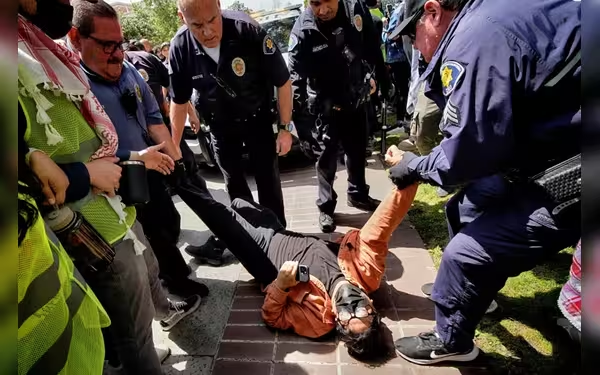Saturday, November 16, 2024 07:48 PM
Universities Face Backlash Over Free Speech Amid Gaza Conflict
- Student protests for Palestinian rights surge across campuses.
- Universities implement strict measures against campus activism.
- Debates on free speech intensify as institutions resist dialogue.
 Image Credits: thefrontierpost
Image Credits: thefrontierpostUniversities in the U.S. face criticism for restricting student protests amid escalating Gaza conflict.
The ongoing conflict in Gaza has escalated to alarming levels, with reports indicating that Israel's actions are tantamount to genocide. As violence spills over into neighboring regions, including Lebanon, the plight of Palestinian communities has become a focal point of international concern. Amidst this turmoil, universities in the United States have found themselves at the center of heated debates regarding free speech, activism, and institutional complicity in global conflicts.
As the new academic year commences, student protests advocating for Palestinian rights have surged across various campuses. Students are demanding a ceasefire and an end to the occupation, urging their universities to divest from companies linked to Israel. However, university administrations have largely responded with resistance. Instead of engaging in dialogue with student activists, many institutions have opted to invite law enforcement to suppress protests, leading to arrests and disciplinary actions against students advocating for their beliefs.
Take Columbia University, for instance. Following the resignation of President Minouche Shafik, the university has implemented strict measures to control campus activities. Access to the campus is now restricted, and new protest guidelines require prior notification for any demonstrations. These changes have raised concerns about the stifling of free speech and the right to assemble, fundamental principles that universities are meant to uphold.
Similarly, New York University has classified “Zionist” as a protected identity, complicating the landscape for activists who criticize Zionism. This move has sparked debates about the boundaries of free expression and the implications for those who wish to voice dissenting opinions. Across the University of California system, a “zero tolerance” policy has been enforced against protests, further illustrating the trend of curbing student activism.
In addition to these measures, Yale University has revised its policies to limit outdoor events and impose strict penalties for violations. The University of Pennsylvania has also introduced new standards that restrict the use of amplified sound and prohibit overnight demonstrations. These policies reflect a growing trend among universities to prioritize institutional stability over student activism.
The implications of these developments are profound. As universities tighten their grip on campus activism, the question arises: what does this mean for the future of free speech in academic settings? Students are increasingly finding themselves at odds with their institutions, which are often seen as bastions of free thought and expression. The tension between institutional policies and student activism raises critical questions about the role of universities in fostering a culture of open dialogue and dissent.
The current landscape of university activism in the United States is a reflection of broader societal issues. As students continue to advocate for justice and human rights, it is essential for universities to strike a balance between maintaining order and upholding the principles of free speech and assembly. The future of activism on campuses will depend on the willingness of institutions to engage with their students and address the pressing issues of our time.













